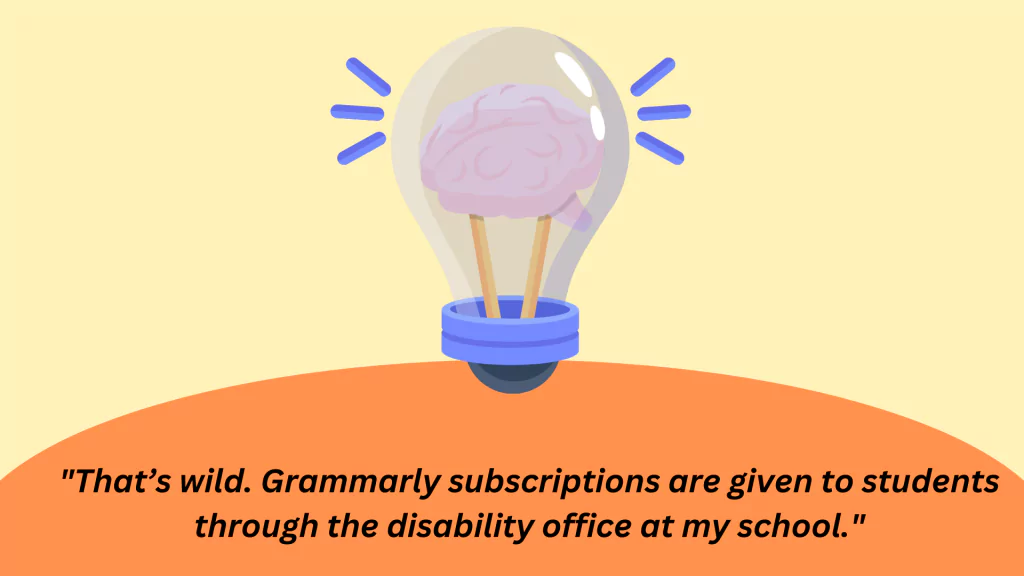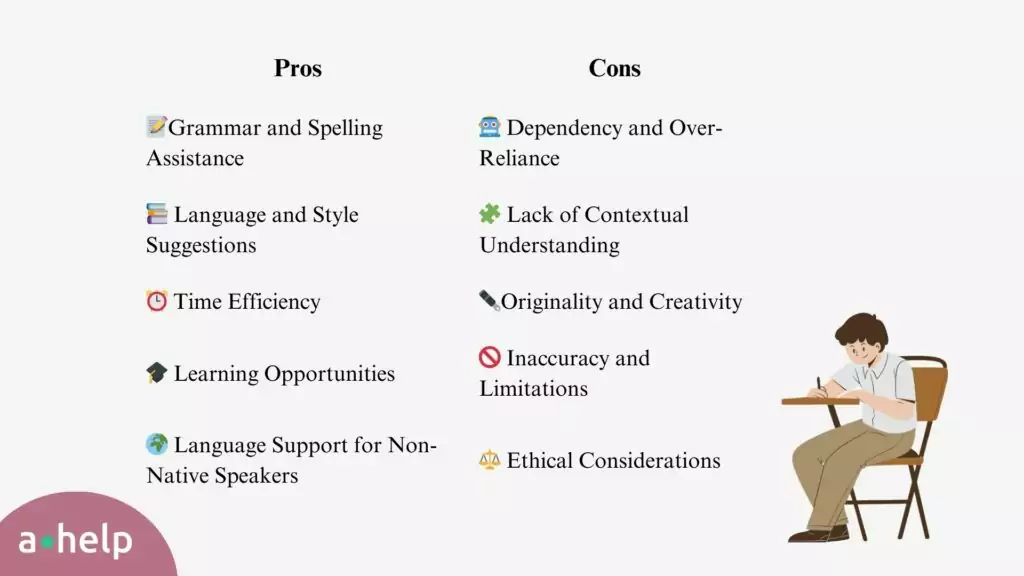In an online English class last month, Alex Johnson, a straight-A student, faced a startling accusation of academic dishonesty for using Grammarly, a popular digital writing assistant tool. Johnson’s predicament has ignited a discussion on the ambiguity of academic honesty policies in the digital age.

✅ AI Essay Writer ✅ AI Detector ✅ Plagchecker ✅ Paraphraser
✅ Summarizer ✅ Citation Generator
The Rising Issue of Digital Tools in Academic Honesty
Johnson, who maintains a perfect 4.0 GPA, submitted a synthesis essay for his online English class in April, which accounted for 10% of his overall grade. He was shocked to receive a 0 on this assignment last week with the teacher’s feedback suggesting the detection of AI use.
The professor requested an email from Johnson for further discussion. Due to scheduling conflicts, Johnson had to settle for a phone call instead of an in-person meeting. During the call, Johnson clarified that he hadn’t used an AI to write his essay, explaining his writing process and drafts, which were prepared using Grammarly.
Grammarly, a tool Johnson had been using for years without issue, and often under the advisement of his teachers, assists with spelling and grammar corrections – a function similar to Microsoft Word’s built-in spell check. However, his professor suggested that using Grammarly was tantamount to cheating according to the academic dishonesty policy.
The Controversy Surrounding the Use of Grammarly
Johnson, however, pointed out that there was no specific prohibition against Grammarly in the syllabus or any other class documentation. Despite this, the professor felt the grade was appropriate, declining Johnson’s request to rewrite the assignment. Johnson now faces the threat of this incident being marked on his permanent academic record as an act of cheating.
Before this incident, Johnson had been enjoying a 99% score in this class. The zero grade on his essay has now dropped his class score to an 84%. Even with perfect scores on his remaining assignments, the best he can hope for is an 89.37%.
The situation has left Johnson questioning if he should escalate the issue to the dean or accept the grade. His predicament raises essential questions about the clarity of academic policies and the need for explicit guidelines on the use of digital writing tools in academia.
This incident has sparked a heated debate on Reddit. Students, teachers, and other Reddit users are sharing their reactions, revealing varying academic policies and attitudes toward digital writing tools.
Several students noted that their institutions provide Grammarly subscriptions, particularly through disability offices. A professor added that their college licenses Grammarly Premium for the entire campus, arguing that it is vital for their students, especially those studying law. The tool not only corrects grammar but also serves as a teaching aid.

Another user pointed out that many schools not only license Grammarly for staff and faculty use but also utilize it for official communications. This reinforces the argument that the tool is generally accepted within the academic community.
One student humorously shared his experience of using AI, in this case, ChatGPT, to write parts of his paper, and not being flagged by any AI detection software. In contrast, a seasoned professor commented that AI tools like TurnItIn are not necessary to detect when a paper isn’t student-written, but they do help in documenting such instances.
“This stuff is funny to me because I used chatgpt to write the intro and conclusion for a paper I had to do and every AI checker said it was ok.”
Most online users expressed support for Johnson and recommended that he appeal the decision. They suggested presenting drafts, final versions, and Grammarly error reports as evidence of the original work. Some commenters encouraged bringing the issue up to the department chair or academic advisors before escalating to the dean.
One student suggested that Johnson ask for a list of software that is considered cheating to avoid future mishaps.
Some users expressed concerns about the potential prohibition of Grammarly, especially given that many schools offer subscriptions. They voiced the need for clarity in academic honesty policies regarding tools like Grammarly, even though such institutions typically use the best AI detectors.
Several students and faculty members advised following the correct reporting chain and not jumping directly to the dean. They stressed the importance of adhering to procedural norms to avoid jeopardizing one’s academic career.
“This is terrifying as hell. Don’t give up, fight with the dean. Get everything your teacher told you here in writing, and forward it to the dean. Grammarly is not cheating nor should it ever be considered cheating. If you give up now the teacher will think that she’s in the right, but in most schools, you will not be found guilty of cheating.”
This incident underscores the need for explicit guidelines and consistency in academic policies regarding the use of digital writing tools. As technology continues to evolve, so too must our approach to ensuring academic integrity.
Balancing Digital Tools and Academic Honesty
The ongoing debate around the use of digital writing tools in academia spotlights a critical need for clarity and consistency in academic honesty policies. As we navigate the digital age, it’s crucial to differentiate between the legitimate use of assistive tools and violations of academic integrity. Our approach to these guidelines must evolve in step with technology, promoting effective learning while maintaining stringent academic standards.
Enhancing Your Writing Skills with AI: The Pros and Cons
AI has revolutionized many aspects of our lives, including the way we write. With the help of AI-powered tools and language models like ChatGPT, individuals can enhance their writing skills and produce more polished and coherent content. However, it’s important to understand the pros and cons of using AI for writing to make informed decisions about its usage. Let’s explore these aspects:
Pros of Using AI for Enhancing Writing Skills
- Grammar and Spelling Assistance: AI-based writing tools can help identify and correct grammatical errors and spelling mistakes, providing real-time feedback that improves the overall quality of written work.
- Language and Style Suggestions: AI can offer suggestions to improve the clarity, coherence, and overall quality of writing by analyzing sentence structure, word choice, and writing style. It can provide alternative phrases, synonyms, and stylistic recommendations to enhance the effectiveness of the content.
- Time Efficiency: AI tools can significantly reduce the time required for editing and proofreading tasks. They can automate repetitive tasks, allowing writers to focus on more creative aspects of their work.
- Learning Opportunities: Interacting with AI models like ChatGPT can provide educational opportunities. AI can answer questions, explain concepts, and offer insights, helping writers improve their knowledge and understanding of various topics.
- Language Support: AI tools can assist non-native English speakers by suggesting appropriate phrases, idioms, or sentence structures, helping them write more effectively in a foreign language.
Cons of Using AI for Enhancing Writing Skills
- Dependency and Over-Reliance: Relying solely on AI tools for writing may lead to dependency, hindering personal growth and the development of individual writing skills. It is crucial to maintain a balance and actively engage in the writing process independently.
- Lack of Contextual Understanding: AI models may struggle to understand the full context, nuance, or specific requirements of a given writing task. They can provide suggestions, but ultimately, humans should have the final judgment in selecting and implementing changes.
- Originality and Creativity: AI tools may focus on grammatical correctness and standardized writing styles, potentially limiting the creativity and uniqueness of individual writing styles. It is important to preserve personal voice and style in writing while leveraging AI tools for enhancement.
- Inaccuracy and Limitations: AI models, including language models like ChatGPT, are not infallible. They can make mistakes or provide incorrect information. It is essential to cross-verify information and not blindly trust the output generated by AI.
- Ethical Considerations: AI models are trained on vast amounts of data, and biases present in the training data can sometimes manifest in the suggestions or responses they generate. Writers must critically analyze the suggestions provided by AI tools and ensure that their writing aligns with ethical standards and inclusivity.

Read More:
- Best assignment writing service: Our top 10 – Reserve Version
- Best assignment service: Our top 10
- Ground News Review 2025
- Media Bias Fact Check Review 2025
- PolitiFact Review 2025
Follow us on Reddit for more insights and updates.





Comments (0)
Welcome to A*Help comments!
We’re all about debate and discussion at A*Help.
We value the diverse opinions of users, so you may find points of view that you don’t agree with. And that’s cool. However, there are certain things we’re not OK with: attempts to manipulate our data in any way, for example, or the posting of discriminative, offensive, hateful, or disparaging material.